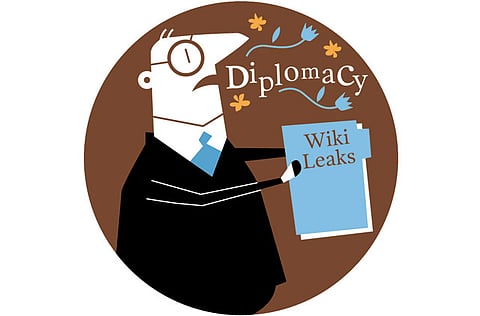Another reading of WikiLeaks
Is it a coincidence that there were 8,000 documents related to Turkey but only a few hundred that dealt with Israel?

Diplomacy used to be an art form, practised by a relatively educated elite, empowered to speak on behalf of astute and, one hoped, wise leaders. Sir Harold Nicholson (1886-1968), the consummate English author and diplomat who penned a widely used study in 1939 under the title Diplomacy: A Basic Guide to the Conduct of Contemporary Foreign Affairs, defined it "not [as] the art of amicable conversation but the technique of exchanging documents in ratifiable form", positing that an accord "committed to writing is likely to prove more dependable … than any agreement which rests upon the variable interpretation of spoken assent".
Nicholson's books and diaries came to mind when the whistle-blowing website WikiLeaks released a trove of secret US diplomatic cables a few weeks ago. Like the erudite Englishman's reportage on several leading figures that marked the 20th century, and who were either acquaintances or professional associates of his, the alleged cables on display relay private conversations with contemporary figures of significance.
Nicholson offered remarks on Ramsay MacDonald, David Lloyd George, Duff Cooper, Charles de Gaulle, Anthony Eden and Winston Churchill, among others, while seasoned American diplomats penned on current monarchs, presidents, and other senior officials.
In both instances, one is privy to intimate analyses even if Nicholson held "amicable conversation(s)" with the aim to "exchanging ratifiable documents".
Naturally, one expects diplomats to use frank language and report confidential conversations accurately, even if these may contain embarrassing comments. What is less welcome, and highly questionable, are anecdotal references attributed to government leaders that cannot be verified.
For example, while it may be amusing to relay that the Libyan strongman, Colonel Muammar Gaddafi loves flamenco dancing or that he "appears to rely" on his senior nurse, the Ukrainian Galyna Kolotnytska, this is peripheral and largely irrelevant to serious policy-making. Likewise, one wonders what may be the value of the declaration attributed to King Abdullah Bin Abdul Aziz of Saudi Arabia to surgically implant people with tracking chips, presumably to monitor their whereabouts.
To be sure, the WikiLeaks cable dump uncovered many serious allegations, including the British government's decision to secretly allow Washington to keep cluster bombs on its soil in defiance of a treaty, or several Arab leaders' frank expressions of fear concerning putative nuclear Iran, even if the latest revelations over sensitive sites may create havoc.
Still, by and large, these cables appear to be strong on metaphor — Russian President Dimitry Medvedev playing "Robin" to his predecessor, Prime Minister Vladimir Putin's "Batman", or that "the Zamundan King has expressed concern that his nation will continue to play a subordinate role to the Republic of Bulungi, much as Gabrielle does to Xena"— which is akin to mundane cut and paste jobs from the internet.
There were even hints of female cat-and-mouse games as the US Secretary of State apparently sought to learn how the President of Argentina Cristina Kirchner handled stress (when she was First Lady). Clinton allegedly sent a cable from Washington to the US Embassy in Buenos Aires — written in all caps and riddled with typos — inquiring how Kirchner managed her "NERVES AND ANXIETY", and whether she was "TAKING ANY MEDICATIONS".
In contrast to such infantile fare, this is what Nicholson wrote concerning Lord Parlmerston — who once dominated British foreign policy — after fellow parliamentarians criticised him for aggressive positions: "He was a man of considerable, if superficial talent, great energy, dog-like courage, unusual knowledge and experience, and a marked gift for negotiation. Yet, he lacked principle." In an equally biting essay published in 1932, Nicholson opined about the wisdom of George Canning's foreign policy principles by stressing that good diplomacy meant certain diplomacy, because "uncertain diplomacy, then as now, was, and is, always bad".
Few might find solace in such prose, written by man who weighed his words and who pondered the consequences of his actions. Nicholson's punditry on Canning ought to add value to our own assessment of what we carelessly call the "war against terrorism" today.
There is little doubt that the release of the WikiLeaks cables will significantly compromise US diplomacy for decades to come and will make it so much harder for young American diplomats in particular to earn the confidence of their interlocutors around the world. Those who consider themselves allies of the US will think twice about any confidences they may wish to share, which will shake the overall intimacy equation. How can one depend on a power whose classified materials are unsafe?
Nevertheless, it is critical not to fall into traps either, for little is actually known on what might be motivating folks to leak scores of diplomatic cables. Was it a sheer coincidence that WikiLeaks possessed 8,000 documents related to Turkey but only a few hundred that dealt with Israel? There may actually be an answer here and, in time, we may unearth it but the happenstance is intriguing nevertheless.
Nicholson advised aspiring diplomats to be loyal, calm and truthful, to display good character and modesty, and have a sense of humour. Ostensibly, reporting hearsay and anecdotes is much easier, which is what WikiLeaks documents reveal, although one hopes that amicable conversations are being held to exchange ratifiable documents too.
Dr Joseph A. Kechichian is a commentator and author of several books on Gulf affairs.



